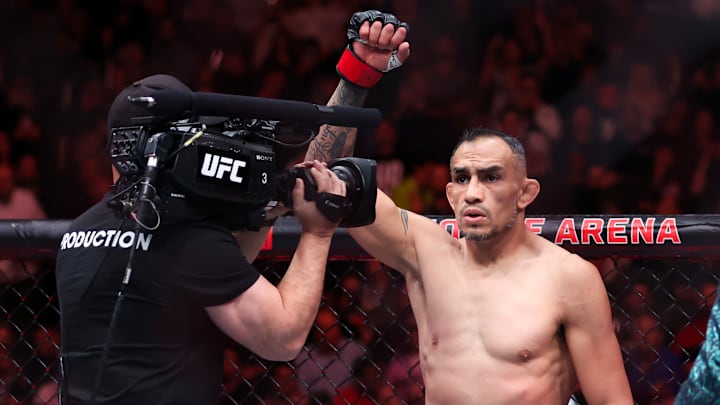With all eyes on Tony Ferguson ahead of UFC's Fight Night in Abu Dhabi, many fans are questioning why Ferguson continues to insist that his days in the Octagon are not over. Post-lockdown viewers may not remember when Ferguson terrorized the lightweight division. Riding a 12-fight unbeaten streak with wins over two former champions, and an interim title to his name, he was once considered the boogeyman of the entire 155-pound weight class. But those days have come and gone. Ferguson is faced with the reality that without a win against Michael Chiesa, he will be heading into uncharted territory with a record-breaking eight-fight losing streak.
Though his days waging war within the Octagon grow fewer, it's important to remember that Ferguson is not the first UFC legend to find themselves with consecutive losses at the end of their careers. This raises the question,does fighting past their prime hurt a fighter's legacy?
Legacy is what a fighter leaves behind. What mark have they made on the sport, and how will they be remembered? The highlight reel moments that captivated live audiences and for years, go on to be shown on jumbotrons as Baba O'Riley blares through stadium speakers. Though these moments can last a lifetime, the most important part of a fighter's legacy is often something most fans overlook. The passing of the torch to the next generation.
Unlike other sports, MMA does not have a season (unless it's PFL). Each loss does not get reset or forgotten when the new year comes around. And though some fighters seem untouchable during meteoric rises to championships, a time always comes when the referee no longer raises their hand, and they do not feel the UFC gold being wrapped around their waist. Fewer fighters than become champions, ever recapture the title once it is lost. Thus begins the inevitable battle with Father Time.
Unless you're George St. Pierre or Khabib Nurmagomedov, it is more often than not you see a fighter continue to compete for years past their athletic prime. Names like Anderson Silva, Frankie Edgar, BJ Penn all come to mind when you mention fighters that held on longer than fans would have liked. But it is these legends and their willingness to wade into the fire with young prospects that provide value and legitimacy to the new generation's records.
Lineage is extremely important in mixed martial arts. When fans sit around debating the next title challengers or who beats who, the conversation almost always turns to past opponents. Think of Israel Adesanya's matchup with = Silva. Though Silva was six years removed from the title picture by the time this fight happened in 2019, it was a pivotal moment for both fighters when Adesanya was crowned victorious. It is this passing of the guard that helps create the next superstars, the next dominant champions, and the future generations of fighters to come.
Of course, it is understandable for fans to be against seeing their once-favorite fighters give up multiple wins to younger athletes. But it is these losses, these sacrifices that breathe new life into our sport. Without them, there would be no path for young prospects to reach those same levels of greatness. So when we consider if fighters continuing to compete past their primes damages their legacy, I think the clear answer is no. Legacy is not just wins and losses. It is the ability to pass on that same glory they once held to the champions of tomorrow.
